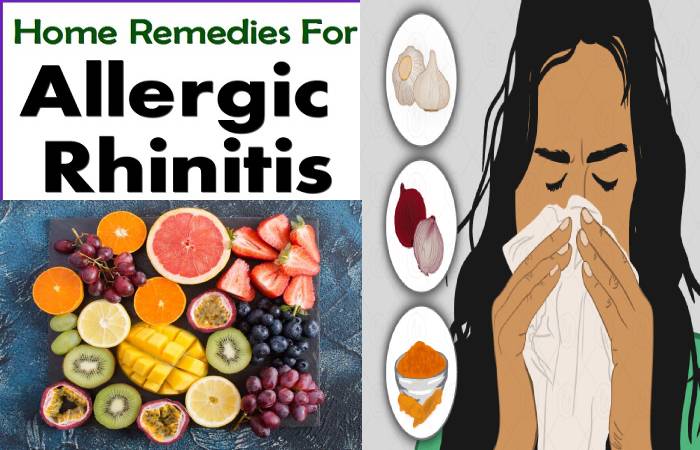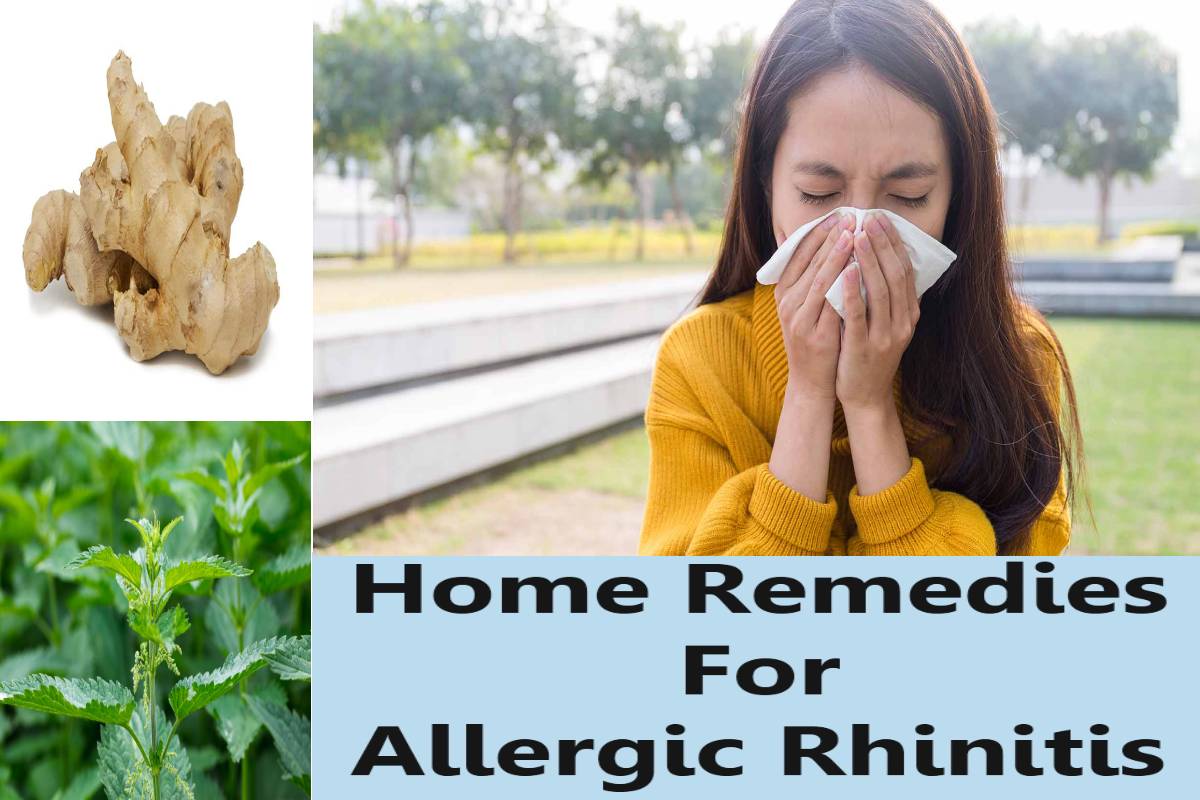Table of Contents
Allergic Rhinitis Definition
Allergic rhinitis is a disease associated with a set of symptoms that affect the nose. These occur when we breathe in something to which we are allergic, such as dust, dander, or pollen.
Symptoms can also manifest when we consume foods to which we are allergic.
Rhinitis usually produces sneezing, sometimes many times in a row, abundant mucus, typically transparent, in the form of a drip, itching of the nose, mouth, eyes, throat, skin or in any area, and nasal plugging.
Also, it causes problems with smell, runny nose, cough, plugged ears, dark circles, puffiness under the eyes, fatigue, irritability, and headache.
Home Remedies to Combat Allergic Rhinitis

Here we give you 10 home remedies to combat allergic rhinitis, which this year has come before because of a hotter winter than usual, causing the pollination of cupresáceas -Pripreses arizónicas- to be advanced. Take note:
1. Saline Water
One of the first steps in treating allergic rhinitis is to remove mucus from the nose with the aid of a saline nasal wash. Regular nasal saline absorption can improve allergic rhinitis symptoms.
Steps:
- Mix 1 tsp of salt and a pinch of baking soda in two cups of hot distilled water.
- With the use of a straw, you must snort a small amount of this solution into one nostril.
- Allow the solution to flow back through the other nostril or the mouth.
- Blow your nose gently to remove excess mucus and the solution.
- Follow this same action with the other nostril.
- Repeat this a couple of times a day until you notice improvement.
- You can also buy a saline mixture at a pharmacy and use it in the same way.
2. Steam
Inhaling steam regularly will help clear your nasal passages of excess mucus and any irritation. In turn, it will help you get rid of the symptoms of allergic rhinitides, such as sneezing, runny nose, and sore throat.
Steps:
- Pour boiling water into a large bowl.
- Add 3-4 drops of eucalyptus, peppermint, rosemary, or tea tree oil.
- Cover your head with a towel and carefully bend over the cup.
- Take a deep breath of steam for 5-10 minutes, then blow your nose thoroughly.
- Repeat the process several times a day until you fully recover.
- For young children who cannot inhale steam, a hot shower or bath will provide significant relief.
3. Ginger
Ginger is another useful home remedy for allergic rhinitis. It is a natural antihistamine and has antiviral, antibacterial, anti-inflammatory, and immunomodulatory properties. It helps relieve rhinitis symptoms such as nasal congestion, runny nose, cough, etc. headache.
Steps:
- Add 1 tablespoon of grated ginger and a small piece of cinnamon to a cup of water.
- Take the liquid to a boil for 5 minutes, strain it, and add a little honey and lemon juice.
- Drink the herbal tea at least twice a day during allergy season.
- You should also chew small pieces of fresh ginger several times a day and include ginger in the dishes you cook daily.
4. Turmeric
It reduces the risk of any allergy; turmeric is the right solution. It is a powerful antioxidant and anti-inflammatory agent. It can aid reduce allergic rhinitis symptoms such as congestion, coughing, dry mouth, and sneezing.
Steps:
- Make a mixture with 6 tablespoons of turmeric powder and honey.
- Mix everything well and store it in an airtight container.
- And also, take a small spoonful of this mixture 2 times a day during allergy season.
- Alternatively, drink a glass of warm turmeric milk daily to keep your immune system healthy.
- You can also use this in cooking or take supplements after consulting a doctor.
5. Garlic
Garlic carries quercetin, a natural antihistamine that can be very useful in treating allergic rhinitis. Additionally, garlic has antibiotic, antibacterial, antiviral, and immune-boosting properties that promote rapid recovery.
Steps:
- Chew 2 to 3 raw garlic cloves every day to combat the various symptoms.
- And also, include garlic powder or raw in your daily cooking.
- People with a history of allergies may benefit from taking a garlic supplement daily during allergy season.
- Consult your doctor for the correct dosage.
6. Apple Cider Vinegar
Apple cider vinegar is useful for allergic rhinitis due to its antibiotic and antihistamine properties. It can help reduce the intensity of frequent sneezing, nasal congestion, headaches, and others. Furthermore, it plays a crucial role in regulating the body’s immune response system.
Steps:
- Add 2 tbs of organic, unfiltered apple cider vinegar to a glass of warm water.
- And also, mix 1 small spoon of honey and lemon juice.
- Drink this preparation 3 times a day during allergy season or until you feel better.
7. Nettle
Nettle uses antihistamine and anti-inflammatory power in alternative medicine to treat seasonal allergies, including allergic rhinitis. It can quickly reduce symptoms such as a stuffy nose, cough, sneezing, and itching.
Steps:
- Add 1 tbs of dried nettle leaves to a cup of hot water. Cover and set it to rest for 5 minutes.
- And also, strain the content and add a little honey. Drink 2 or 3 times per day till the symptoms disappear.
- You can also take nettle supplements (600 mg a day for a week).
- Check with your doctor first if this herb can interfere with certain medications you may be taking.
- Important Nettle does not recommend for pregnant women and young children.
8. Traction Oil
Oil pulling is an ancient Ayurvedic technique that can help eliminate the irritation that causes allergic rhinitis. Plus, it helps get rid of toxins, which is essential for staying healthy all year long.
Steps:
- Take 1 tbs of sesame oil or coconut oil.
- Make a mouthwash with the oil for 15-20 minutes.
- Spit out the oil, then rinse your mouth out with warm water.
- And also, do this every day in the morning (for at least a few months) before brushing your teeth.
Necessary: Do not swallow the oil, as it can be full of toxins after this process.
9. Probiotics
The probiotic Lactobacillus acidophilus can help reduce the frequency and severity of allergic rhinitis symptoms.
Steps:
- Buy a high-quality probiotic supplement. Take one capsule in the morning and night for 1 to 2 weeks.
- And also, you can eat probiotic yogurt regularly to boost your immune system.
10. Vitamin C
Vitamin C has antihistamine properties that can aid reduce allergy symptoms. And also, vitamin C will help boost your immune system. It, in turn, will help prevent infection as well as shorten the duration of an illness.
Steps:
- Eat vitamin C foods like lemons, oranges, broccoli, orange, kiwi, bell peppers, potatoes, strawberries, cabbages, and tomatoes.
- You can also take Vit C supplements every day, but it is always best to consult your doctor before taking any supplements.
Also Read: What is Risperdal? – Uses, Symptoms, Causes, Side Effects, and More

